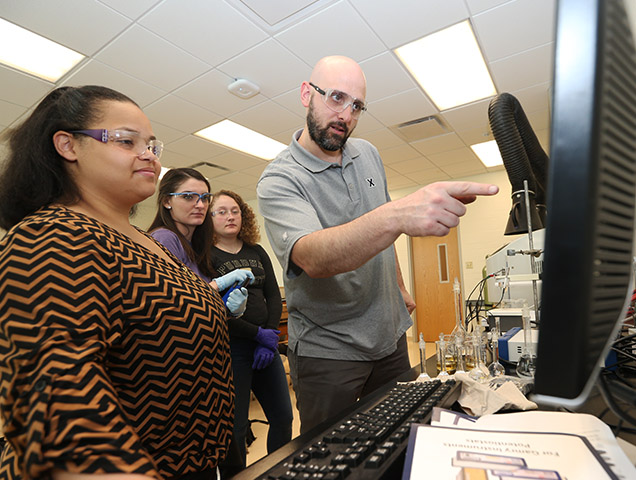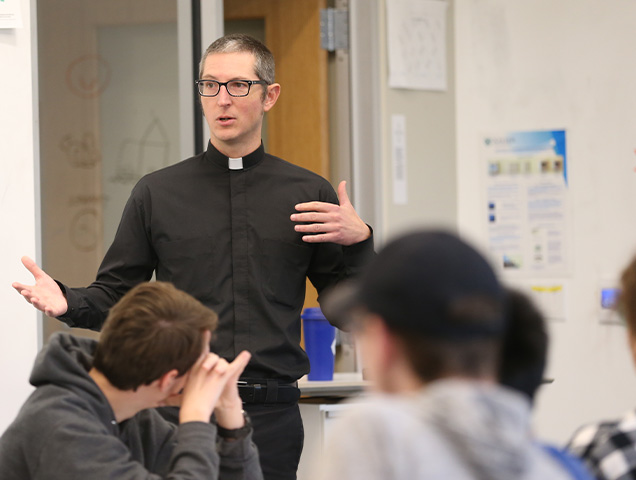Applied Physics
Program Details
Physics is about exploring the universe on a large scale all the way down to the sub-atomic level. As an applied physics major, you’ll conduct experiments, research alongside expert faculty and learn the foundations of physics, mathematics and engineering. You'll also have access to multiple labs with the latest equipment, including a holography lab, atomic and nuclear labs, optics lab, superconductivity lab, atomic force microscope lab, a thin-film deposition system and an astronomical observatory.
Xavier University, located in Cincinnati, Ohio, is nationally recognized as a top university by U.S. News & World Report and The Princeton Review. 99 percent of our students, including those in the applied physics major, are working, volunteering or in graduate school within six months of graduation (Class of 2022). Additionally, Xavier students have an 86% acceptance rate to medical schools (5-year average, Class of 2022), compared to 40% nationally.
Optional Concentration
Engineering
Degree Awarded
Bachelor of Arts in Applied Physics
Curriculum
The sample course sequence below illustrates class offerings for the Applied Physics major. Consult the official Xavier University course catalog for detailed registration and advising information.
Fall
- Core 100: First-Year Seminar............ 3cr.
- Core 101: GOA............ 0cr.
- Second Language 103 Level............ 3cr.
- ENGL 101: Composition............ 3cr.
- Elective............ 3cr.
Spring
- MATH 169: Precalculus or Elective............ 3cr.
- Theology 111: Theological Foundations............ 3cr.
- Core 102: GOA............ 0cr.
- Second Language 201 Level............ 3cr.
- PHIL 100: Ethics............ 3cr.
- Elective............ 3cr.
Fall
- PHYS 170: University Physics I............ 3cr.
- PHYS 171: Explorations in Physics............ 3cr.
- MATH 170: Calculus I............ 3cr.
- Theological Perspectives............ 3cr.
- ENGR 101: Introduction to Engineering............ 3cr.
- Elective (3)............ 3cr.
Spring
- PHYS 172: University Physics II............ 3cr.
- PHYS 173 or ENGR 173: Lab............ 1cr.
- MATH 171: Calculus II............ 3cr.
- ENGL 205: Literature and Moral Imagination............ 3cr.
- Elective............ 3cr.
Fall
- PHYS 330: Modern Physics I............ 3cr.
- PHYS 331: Modern Physics I Lab............ 1cr.
- PHYS 242: Circuit Analysis............ 3cr.
- PHYS 243: Design Experience: Circuit Analysis Lab............ 1cr.
- MATH 220: Calculus III............ 3cr.
- Philosophical Perspectives............ 3cr.
Spring
- PHYS 244: Electronics............ 3cr.
- PHYS 245: Electronics Lab............ 1cr.
- PHYS 350: Mechanics............ 3cr.
- PHYS 355: Advanced Lab............ 1cr.
- ENGR 180: Mathlab............ 3cr.
- Humanities Elective............ 3cr.
- Elective............ 3cr.
Fall
- PHYSICS 395: Physics Research............ 1cr.
- Program Elective............ 3cr.
- Elective............ 3cr.
- Social Science Elective............ 3cr.
- Program Elective............ 3cr.
- Program Elective............ 3cr.
Spring
- Physics 398: Physics Thesis............ 1cr.
- Program Elective............ 4cr.
- Creative Perspectives............ 3cr.
- DCR or Elective............ 3cr.
- Program Elective............ 3cr.
- Elective............ 3cr.
Physics Courses
Sample courses within the physics major curriculum:
- Physics I (PHYS 170)- This calculus-based course explores fundamental concepts in mechanics, including: kinematics, force analysis, conservation of energy and conservation of momentum. Strong emphasis is placed on the application of these concepts toward problem solving. Students taking this course are expected to be proficient in basic trigonometry and algebra.
- Modern Physics I (PHYS 330) - This course explores how the experiments of the late 19th and early 20th century revolutionized our understanding of nature, and presents the basic principles of the two theories that emerged as a result: special relativity and quantum physics. The application of quantum theory toward an understanding of hydrogen-like atoms is presented. Emphasis is placed on the conceptual understanding of the course material and on the quantitative analysis of the physical systems explored in the course.
- Theoretical Mechanics I (PHYS 350) - This course reinforces concepts from PHYS 170 through the study of classical mechanics via the application of advanced mathematics. The course covers linear and 3D motion; oscillations (simple, damped and driven); gravitational forces; within the Newtonian and Lagrangian frameworks. Emphasis is placed on examples that use mathematical treatment of fundamental concepts.
- Introduction to Fabrication- (ENGR 101) This course introduces students to a variety of traditional and modern tools and techniques for making physical objects. Students will develop a basic understanding of health and safety in a workshop environment and will develop an understanding of how to use these tools and techniques.
Physics Careers
99% of Xavier students, including those in the applied physics major, are working, volunteering or in graduate school within six months of graduation (Class of 2022). Additionally, Xavier students have an 86% acceptance rate to medical schools (5-year average, Class of 2022), compared to 40% nationally. Explore Xavier's Career Outcomes Dashboard to view career outcomes by major.
Careers: Accelerator Systems Operator, Advanced Technology Engineer, Computer Scientist, Computer Engineer, Engineering Physicist, Laboratory Technician, Radar Developer, Systems Engineer, Science Teacher, Physicist
More: Xavier's Career Development Office assists students in their search for employment by offering individual career counseling sessions, conducting workshops and maintaining an employer database. More than 100 nationally known companies visit the campus annually to interview graduating seniors for open positions.
Physics Clubs
- Physics Club- Students in the Physics Club organize trips to national labs, host cool experiment series and events that connect to physics, like ice skating (friction!) and water balloon launches.
- Alchemyst Club- Ever been to a liquid nitrogen ice cream social? This club is made up of chemistry enthusiasts who love to experiment and discuss the ins and outs of the study of matter.
- Minorities in STEM Succeeding Together- Become part of a supportive community dedicated to empowering minority STEM majors. Discover a space where you can thrive, connect with peers and build confidence in your identity while pursuing excellence in STEM.
When we seek something more, we become something greater.
Find more information about how you can become a Musketeer.
Request InformationGain Expertise in a Physics Program Focused on Research

There are numerous opportunities for undergraduate research at Xavier, allowing you to dive deeper into topics that interest you within the field of physics. Whether you're exploring cutting-edge technologies or solving practical problems, these research experiences will enrich your education and prepare you for future endeavors.
Benefit from Small Class Sizes and Personal Attention

At Xavier, you'll benefit from smaller class sizes and a tight-knit academic community. This will help prepare you for advanced degrees in physics, engineering or another field where having scientific and technical knowledge is an advantage (e.g. entrepreneurship, patent law, business innovation and environmental engineering).
Kickstart Your Physics Career in Cincinnati, Ohio

Cincinnati offers numerous career opportunities in the engineering, technology, research and healthcare industries. Here, you'll have access to countless internships, research opportunities and networking events that will enhance your academic experience and career prospects.
Graduate With Honors
Are you looking for an academic challenge? The University Scholars Honors Program offers incoming students a more challenging curriculum and close support from professors while completing their undergraduate degree. Acceptance into the program is highly selective and includes a $2000 travel grant.
Applied Physics Major at Xavier University
The Applied Physics program at Xavier has small classes and provides a close interaction between faculty and students. The Alternate Concentration option provides maximum flexibility to students who are interested in pursuing interdisciplinary programs. This program combines the study of physics with a concentrated study in another area or discipline. Concentrations must include at least 18 hours in one chosen area, which allows for the majority of University minors to be included. Areas of concentration may be chosen from the sciences, mathematics, the humanities, the social sciences, business, and education. If mathematics is selected as an area of concentration, the courses must be in addition to those required by the Applied Physics major. The Natural Sciences option offers an alternative to the Natural Sciences major that allows students to study physics while preparing for medical, dental, or veterinary school. This program may also be of interest to students who wish to pursue careers in medical physics, radiological physics, and other health physics programs. The Natural Sciences program combines courses in physics, mathematics, and computer science with the chemistry and biology courses needed to fulfill the requirements for the Natural Sciences minor.
Xavier University’s College of Arts and Sciences challenges students to develop an integrated understanding of humanity, the world, and God by pursuing the questions raised in Xavier's core and departmental curricula. The College of Arts and Sciences is the oldest and largest college at Xavier University. The college provides an excellent liberal arts education in the Jesuit tradition that prepares students for careers, professional or graduate school, and life in a global society.
Xavier University is a private university located in Cincinnati, Ohio, providing a liberal arts education in the Jesuit Catholic tradition. Founded in 1831, the University is the sixth-oldest Catholic university in the nation. It has been ranked among the top 10 master's-level universities in the Midwest by U.S. News & World Report for the past two decades. The Princeton Review names it one of the "Best 385 Colleges in America."